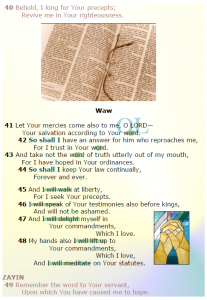 You may notice a tighter connection between verses here than what you’ve come to expect from Psalm 119–there’s more of a natural flow from one verse to the next. That’s because in the original Hebrew, each of these verses begins with the word “and.”
You may notice a tighter connection between verses here than what you’ve come to expect from Psalm 119–there’s more of a natural flow from one verse to the next. That’s because in the original Hebrew, each of these verses begins with the word “and.”
“Take not the word of truth utterly out of my mouth” could be interpreted either as a continuation of the psalmist’s plea in vs. 41 for salvation (i.e., “If you don’t save me, I won’t be able to speak for you”) or, as in many other of the psalm’s verses, a prayer for help in maintaining integrity (i.e., “Help me live in obedience to your word, so I do not lose my ability to speak it with authority”). Either is possible, but I favor the second. The voices of those killed for their faith in God grows stronger after their death, but who can weigh the cost of loss of integrity? Lord, I’ll die like Stephen if I must, but don’t let me end like Solomon.
I love the truth expressed in vs. 45: True freedom means tying yourself to a quest of God’s precepts. As Alexander Maclaren notes, “Restraints that are loved are not bonds, and freedom consists not in doing as I would, but in willing to do as I ought.” The word translated liberty here is literally “in a large place” or “at large.” (Compare with vs. 96, “Your commandment is exceedingly broad.”)
Verse 46: If the psalmist’s equanimity is not disturbed by the accusations of princes (vs. 23), he will clearly not tremble at the opportunity to share God’s testimonies before kings.
